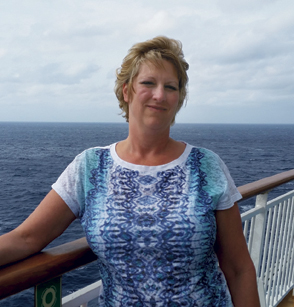BROKEN GLASS
BREAKING AWAY
This agency owner chose independence over a captive situation—and never looked back
By Elisabeth Boone, CPCU
As we know, few of us planned to pursue a career in insurance, and stories abound of the circuitous paths that led us to an industry that we had never contemplated entering. Why did Wendy Ashe, a successful lawyer, decide to leave her practice for a field that had never crossed her radar screen?
“I practiced law for about eight years,” she says. “After the births of my two sons I decided to stay home with them. I own a horse farm, and it was insured by a captive agent, Peter Plastridge. I went into his office one day, and he told me that if I ever decided to go back to work, I should consider insurance because he thought I’d be a natural. My immediate reaction was ‘Insurance? Who wants to be in insurance?’ He suggested that we do a trial run and if I liked it, he wanted me to take over his business. So I gave it a try, and I discovered that I really liked it,” Ashe says with a laugh.
As the owner of a horse farm, Ashe was pleased that the agency wrote a substantial volume of farm and equine business. “I loved calling on clients because I could see newborn calves, piglets, goats, and sheep, and hang out with people who are the salt of the earth. Where else can you make a living by visiting a farm stand, sipping homemade lemonade, and taking home a basket of fresh-picked raspberries?”
What may not have been love at first sight became a passion for Ashe, and in 2005 she took over Plastridge’s book of business. “The renewal rights belonged to the insurer, so we couldn’t actually buy the business,” she says. “At around that time I was approached by Richard Bourgault, who suggested we join forces and form a new agency.”
By 2008, Ashe continues, “I was getting frustrated because clients were calling to complain about rate increases, reductions in coverage, and even cancellations. I could have moved their accounts to insurers that offered more favorable terms—but I was a captive agent, so that wasn’t an option. When you’re contracted to sell the products of only one carrier, you’re put in the position of trying to convince your clients that one size really does fit all—even when it doesn’t.”
That year she and Bourgault obtained an appointment with Hanover to write the business of the clients who were displeased with the captive agent company.
In 2010, she and Bourgault established A&B Insurance Group, LLC, in Westford, Massachusetts. An affiliated agency, River Valley Insurance, is located in South Deerfield. John Oakes joined A&B in 2011 as a co-owner.
Today, A&B is a full-service independent agency that represents 16 insurers and writes all lines of personal and commercial insurance as well as life, disability, and long-term care. Specialties are farm and equine insurance and contractor packages.

—Wendy Ashe
Co-founder and Principal
A&B Insurance Group, LLC
“We realized that with a captive carrier, we couldn’t serve our clients the way we wanted to,” Ashe says. “The carrier was raising rates, and we had no options to offer our clients. A carrier may have a good product in one category but not in others. We couldn’t in good conscience sell a client a policy that didn’t meet his or her needs. Once we became independent, we began to rewrite policies with the companies we represented.”
Upon termination of their contract with the captive carrier, Ashe and Bourgault lost all the renewals on their business and had to start their new agency from scratch.
“Under our noncompete agreement, we couldn’t solicit any of those clients,” Ashe explains. “If a former client approached us, however, our understanding was that we could write the account.” The captive insurer challenged A&B’s interpretation, and after an undisclosed settlement, A&B was allowed to continue writing that business.
“Within months, most of our former clients had come back to us because we could offer more competitive rates and had the flexibility to place accounts with the companies that could best meet their needs,” Ashe recalls. “A common theme among our returning clients was that it is the agency, not the insurance company, that mattered. In our first year we wrote between $1,250,000 and $1.5 million in premium, and we’ve been growing ever since.”
Then and now
Ashe isn’t old enough to remember the days when women who wanted to pursue a career in insurance were confronted with a glass ceiling that was as high as a skyscraper—but she vividly recalls beginning her career on a distinctly unlevel playing field.
“When I got my license, at every agency I dealt with the women were mostly secretaries while the men were agents,” she says. “The women did the work but didn’t get any of the credit. At my first agency as a client, I’d spend five minutes with the agent, who was a man, and the women did everything else, without recognition or compensation.”
That’s not all. “When I was in the process of acquiring the right to service the business I had placed with the captive agent company, a manager said to me, ‘You have small children, don’t you? How do you think you’re going to be able to manage a book of business of this size and still be able to take care of your kids?’ I said: ‘If I could manage a successful law firm while caring for my two sons, I doubt if I’ll have a problem running an insurance agency.’ I was appalled that he asked me that question, which of course he never would have asked a man,” Ashe says.
On a brighter note, Ashe sees women making impressive strides toward achieving leadership positions in insurance, especially on the company side where a number of chief executive officers are female and many women hold senior positions in underwriting. “I attend company functions and am pleased to see women holding top management positions,” she says. On the agency side, she notes that most owners are still male but says she sees more women starting or acquiring agencies than was the case 20 or even 10 years ago. She adds that many more women are producers today, with a number coming from the ranks of CSRs.
“In our business, success isn’t achieved with physical strength,” Ashe remarks. “All that matters is what’s between your ears, and women are just as smart as men. I’m optimistic about the future of women in our industry.”
Asked what advice she would give to a young woman who may be considering a career in insurance, Ashe responds: “If you like helping people, the insurance business offers a great opportunity to make money while doing something you really enjoy.”
As for herself, “Going into the insurance business, I thought it would be dry and boring,” Ashe says. “That couldn’t be further from the truth. I love my clients and have established strong relationships with them. Helping them be successful in their businesses or their homes or their lives is fantastically rewarding for me.”
Do you know a female independent agency leader we should feature? If so, please email details about her as well as contact information to Elisabeth Boone, CPCU, senior features editor (elis.boone@icloud.com). We’ll take it from there.





